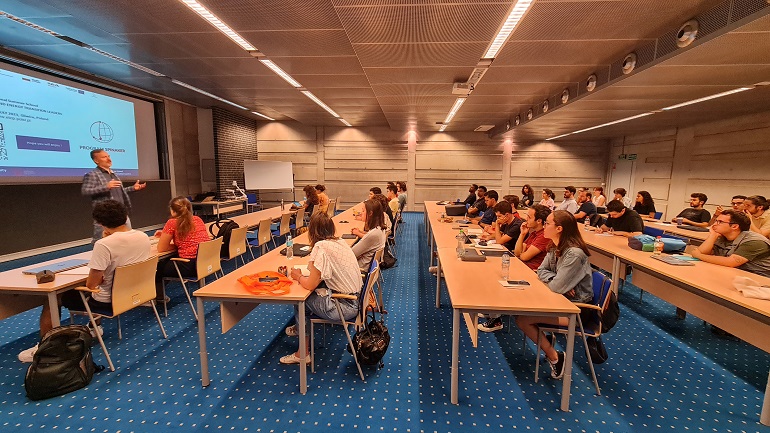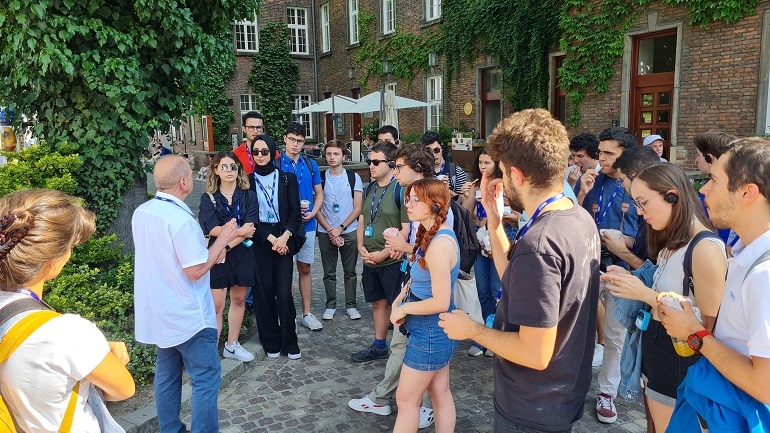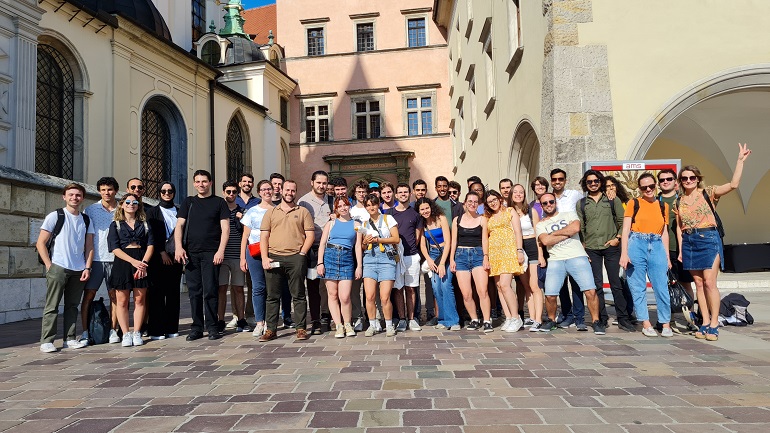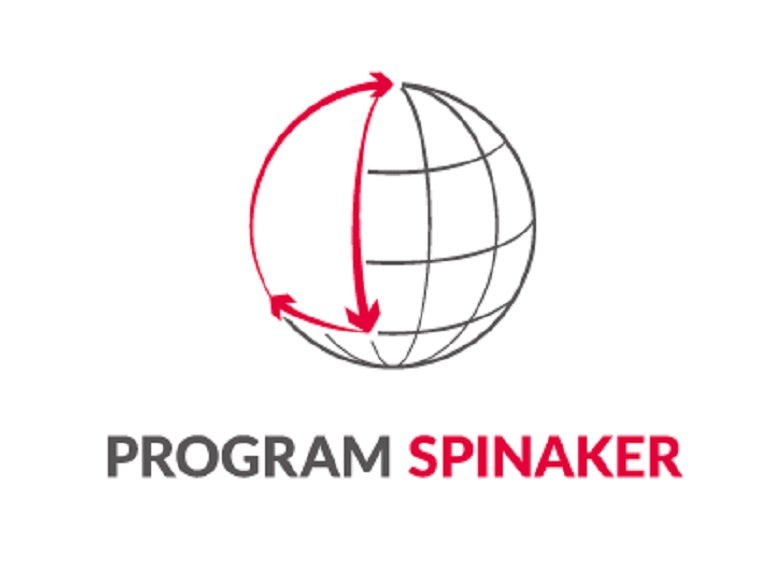Start - Aktualności - A vision of an effective Energy Transformation

A vision of an effective Energy Transformation
The International Summer School “Circular Economy and Energy Transition Leaders” (CEET) was held at the Faculty of Energy and Environmental Engineering of the Silesian University of Technology. The event brought together engineers from 10 countries around the world.
During the intensive course, the participants had a unique opportunity to discover and deepen issues in the field of sustainable development, energy transformation and the circular economy. They also met with experienced scientists from Poland and abroad, gaining first-hand knowledge and developing skills necessary to build a clean, effective and sustainable future. In addition, the participants had a unique opportunity to learn about Polish culture and the achievements of Polish scientists and technicians. The CEET International Summer School has attracted the interest of students from all over the world, creating a dynamic and inspiring environment for the exchange of ideas and cooperation.
Energy transformation and circularity are one of the most important challenges facing Poland and the world. As part of the energy transformation, Poland sets itself ambitious goals in terms of reducing greenhouse gas emissions and increasing the share of renewable sources in the country's energy mix. To this end, the government is introducing a number of legal and financial solutions aimed at encouraging investment in renewable energy sources and reducing greenhouse gas emissions. As part of circularity, Poland aims to increase the efficiency of the use of secondary raw materials and reduce the amount of waste. Other countries around the world have similar goals.

The future prosperity and quality of life of our planet depend on the intelligent use of available resources, creating a more integrated energy system based on renewable energy. Such a system should be effective, safe, resilient, accessible, clean and sustainable. Therefore, new concepts, design patterns, theories, research methods, technologies and standards are being developed all over the world.
The main challenges in this area include the implementation of circular economy solutions through energy and material recovery technologies. We strive to create a system in which waste will become a valuable raw material, thanks to which it will be possible to optimize energy consumption and search for new energy sources. Another challenge is the transition to low-carbon energy technologies. We want to reduce our dependence on fossil fuels and replace them with greener energy sources. Diversification of energy sources and creating an optimal energy mix is another important challenge that our civilization will have to face in the future.
The long list of challenges certainly also includes the resilience and flexibility of the energy system. The introduction of energy storage will allow us to balance fluctuations in energy supply and demand, which is crucial for the stability of the energy system. Along with this, there is an increase in the degree of decentralization of the energy system. Moving energy production closer to where it is used will allow us to reduce energy losses and increase its efficiency.
Last but not least, the challenge is to provide solutions that are cost-effective and accessible to all, so that sustainable development is possible for all communities, regardless of their economic status.

All these challenges formed the foundation of the International Summer School program "Circular Economy and Energy Transition Leaders". Its aim was to deepen and update knowledge on the latest scientific and technological achievements that lead us towards a sustainable and low-emission future. The Silesian University of Technology is a place where students, researchers, experienced scientists and practitioners meet to share knowledge and experience in the field of circular economy and energy technologies. All participants had the opportunity to learn about the latest trends in the development of methods and technologies that contribute to the energy transformation and climate protection as well as the protection of our planet's natural resources.
– We are glad that the CEET International Summer School has contributed to raising the level of awareness and knowledge on key issues related to the circular economy and renewable energy. Thanks to this event, students had the opportunity to learn about the latest trends and technologies, as well as to be inspired by the teaching and culture of Poland. It was an extremely important initiative that will help us jointly strive to achieve a sustainable future - said the chairman of the Organizing Committee, prof. dr hab. Krzysztof Pikoń.
The International Summer School was important for its comprehensiveness and timeliness of sustainable energy topics. Thanks to the school, the participants had the opportunity to deepen their knowledge on the latest scientific and technological achievements related to the circular economy and renewable energy. In addition, the summer school contributed to raising the level of knowledge of Polish culture and the achievements of Polish scientists and technicians, which was an additional advantage for participants from outside Poland.
Students evaluated their participation very positively, giving an overall score of 4.8 on a scale of 0 to 5. They highly appreciated the work of lecturers and the quality of educational materials. An additional advantage was the opportunity to establish contacts and exchange experiences with other participants. An important element was also getting to know Polish culture and the achievements of Polish scientists and technicians throughout history.
The CEET International Summer School was organized by the Silesian University of Technology in cooperation with renowned foreign universities. The classes were conducted by lecturers from abroad: prof. Tetyana Morozuk from the Technical University of Berlin, Dr Franziska Mey from the Research Institute for Sustainable Development in Potsdam, Dr Ricardo Pereira from the Instituto Superior Técnico in Lisbon, prof. Ricardo Chacartegui Ramirez from the University of Seville and prof. Goran Krajačić from the University of Zagreb.
Classes were also conducted by specialists from the Silesian University of Technology: prof. Anna Skorek-Osikowska, prof. Wojciech Stanek, dr Marcin Landrat, dr Tomasz Bura, prof. Krzysztof Pikoń and prof. Jacek Kalina. The school was organized as part of the NAWA Spinnaker project. In the Organizing Committee were: prof. Krzysztof Pikoń, prof. Jacek Kalina, Joanna Mehlich and Katarzyna Piecha Sobota.

The NAWA agency works for the internationalization of Polish science by supporting and stimulating international research cooperation and academic exchange. These goals are achieved thanks to the wide program offer of the Agency: Programs for Scientists, Programs for Institutions, Programs for Students and Polish Language Programs.
The NAWA agency participates in a long-term policy to support academic mobility and pro-quality internationalization of the offer of Polish universities.
The SPINAKER - Intensive International Education Programs program was aimed at the internationalization of Polish higher education and science institutions by financing projects aimed at increasing interest in the educational offer in Polish science and higher education institutions among foreign students and doctoral students, increasing the participation of foreign students and doctoral students in education programs at Polish universities and expanding the offer of intensive international education programs, also implemented in a hybrid or distance learning formula.
By Joanna Mehlich










